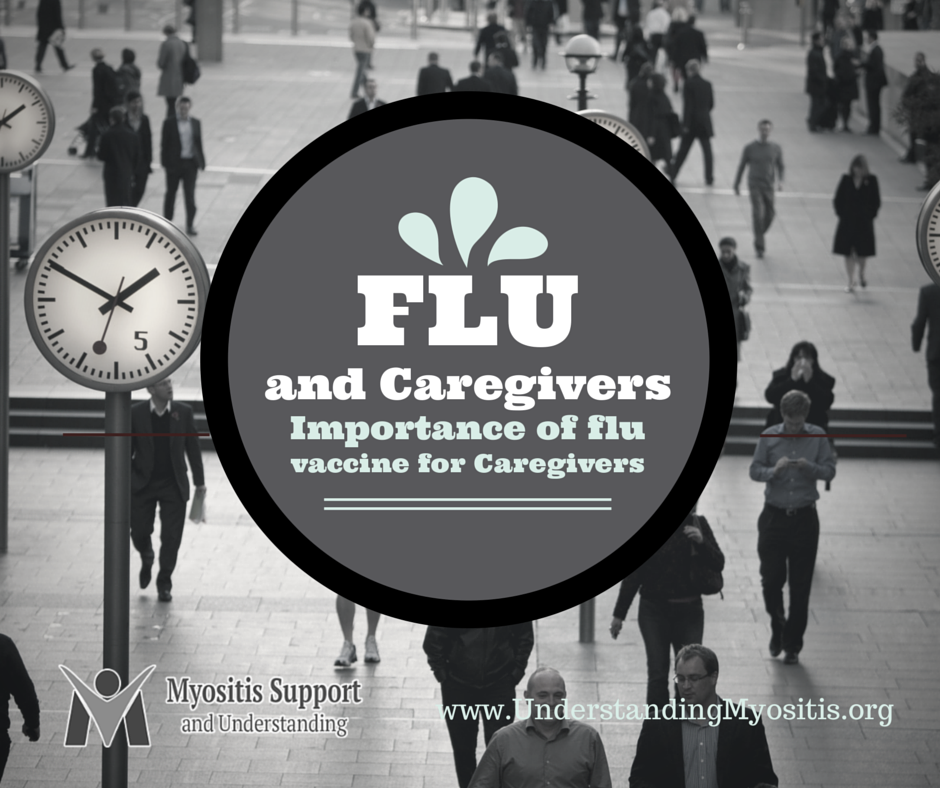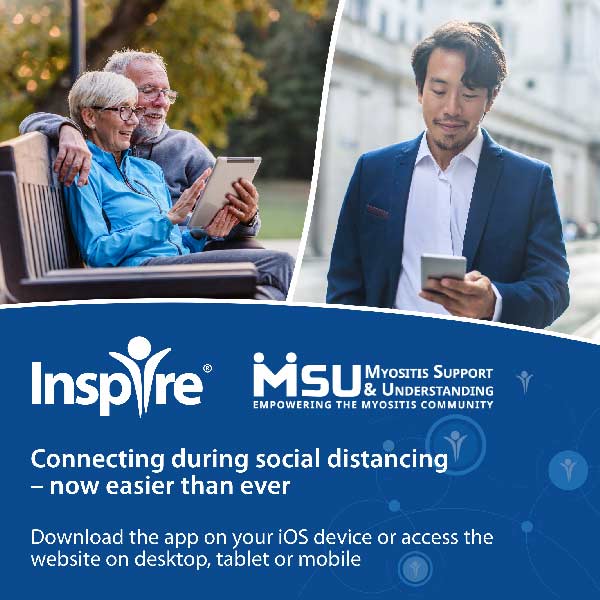There are two major reasons for you, as a caregiver, to receive the flu vaccination:
- To protect yourself so you can continue to be an effective caregiver.
- To protect the person you care for whose immune system may have a difficult time fighting the flu.
According to the Centers for Disease Control (CDC), this year’s flu vaccine is about 62% effective in protecting a healthy person against the flu, however, it is considered helpful in making the symptoms less serious should the person get the flu.
The flu vaccine is even less effective in people who have a compromised immune system, whether due to age, illness or from taking immune-suppressing drugs such as the those prescribed to the majority of #Myositis patients.
In fact, patients with chronic diseases are at approximately double the risk of infection compared to the normal population. This is due, in large part, to the immunosuppressive therapy administered to these patients but also may be caused by the autoimmune system gone awry. The respiratory tract is most commonly affected in patients with autoimmune disease and the flu most often targets this area.
It is highly recommended that caregivers of those who are immunosuppressed be vaccinated against the flu to add an additional layer of protection for their patients.
MORE FLU FACTS:
- Influenza often leads to pneumonia or complications in older people.
- More than 200,000 are hospitalized and 36,000 die from influenza annually in the United States.
- 90 percent of influenza-related deaths are in persons age 65 and over or are people who have a compromised immune system.
WHICH VACCINE IS RECOMMENDED?
There are two types of flu vaccines (1) injection, and (2) nasal spray. The nasal spray is not recommended for someone with a compromised immune system because it contains live virus. Caregivers and household members of people who are immunosuppressed should also receive the injection or not have contact with the immune-compromised person for at least 7 days after receiving the live vaccine via nasal mist spray.
WHAT HAPPENS IF THE CAREGIVER GETS SICK?
Have you thought of what happens if you, the caregiver, get sick? An Illness, such as the flu, would only compound the situation by exposing your germs to the patient as well as take you away from caregiver duties. Hopefully getting the flu vaccination will prevent the flu for you and the person you care for, but if either of you show symptoms such as a sore throat, runny nose, cough, fever, headache and muscle aches, here are some recommendations offered by the Muscular Dystrophy Association:
- Stay at home and rest.
- Avoid close contact with well people in your house so you won’t make them sick.
- Drink plenty of water and other clear liquids to prevent fluid loss (dehydration).
- Treat fever and cough with medicines you can buy at the store.
- If you get very sick, are pregnant, or are 65 years or older, or are otherwise at high risk of flu-related complications, call your doctor. You might need antiviral drugs to treat flu.
MORE PREVENTATIVE MEASURES
People contract the flu from an infected person or germy surface such as door knobs, elevator buttons handrails on stairs and public transportation. Droplets from the sick person coughing, sneezing or talking can travel to your mouth or nose.
- Wash your hands and your care partner’s hands often with soap and water for at least 20 seconds, especially after sneezing, handling a tissue or being in close contact with others.
- Cough or sneeze into a tissue (not your hand, and if so wash immediately) and throw it out immediately. If there is no tissue immediately available, use the inside of your elbow, not your hand to cover your mouth.
- Avoid shaking hands and sharing drinks or food.
- If you have the flu or a bad cold, wear a drug store or doctor’s office mask around the house and don’t go out until 24 hours after the fever is gone.
- Use disinfecting wipes when someone with a cold, cough or flu has been around, especially during flu season. Also use wipes in airplanes, on car door handles, banisters, kitchen counters, doorknobs, in stores that require communal pens for credit card payments, grocery carts and other surfaces in public places.










